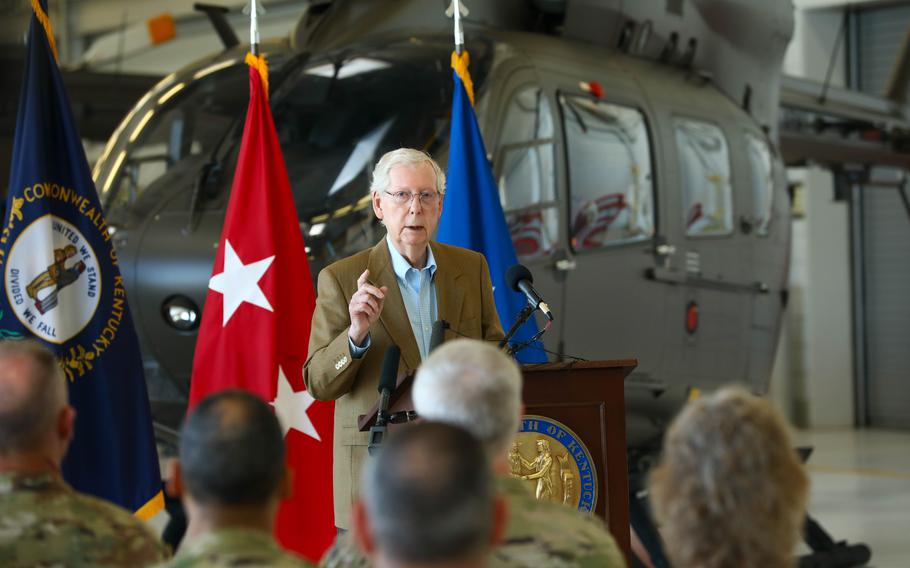
Sen. Mitch McConnell, R-Ky., holds a news conference May 30, 2024, at the Army Aviation Support Facility on Boone National Guard Center in Frankfort, Ky. (Georgia Napier/U.S. Army National Guard)
WASHINGTON — When Republicans take control of the Senate in January, the chairmanship of a panel that overseas military spending will fall to one of the upper chamber’s most prominent defense hawks.
Sen. Mitch McConnell of Kentucky, the Senate’s longest-serving leader, will become chairman of the Senate Appropriations Committee’s defense subpanel when he steps down from his leadership post next year. He said he intends to use his new perch to pour resources into the military.
“America’s national security interests face the gravest array of threats since the Second World War,” he said. “At this critical moment, a new Senate Republican majority has a responsibility to secure the future of U.S. leadership and primacy.”
McConnell is a proponent of former President Ronald Reagan’s “peace through strength” approach to foreign policy and is the Senate’s most vocal Republican supporter of NATO and aiding Ukraine in its war with Russia.
Those positions put him at odds with President-elect Donald Trump, who has threatened to pull the U.S. out of NATO and force Ukraine into negotiations with Russia. In February, Trump said he would encourage Russia to “do whatever the hell they want” to any NATO member that does not meet the alliance’s defense spending benchmarks.
McConnell in recent years has pushed back against the growing isolationist bent within his party. He frequently took to the Senate floor this year to urge Republicans to vote for a major aid package for Ukraine and, in July, spoke of the need to counter interconnected threats from Russia, China and Iran.
“To meet them seriously, we must invest seriously in our defense,” he said during a visit to the Kentucky National Guard earlier this year.
As chairman of the defense appropriations panel, McConnell is expected to advocate for a larger defense budget to expand the defense industrial base, rebuild stockpiles and invest in military strength. He has argued spending on a defense buildup now is cheaper than funding a war later.
“In World War II, we were up to 37% of our [Gross Domestic Product on defense]. Right now, we’re spending about roughly 2% of our GDP,” he said in remarks to Guard members. “That needs to come up if we’re going to be adequately prepared to avoid having way more spending, coupled with loss of life as well.”
McConnell will find a willing partner for achieving that goal in Sen. Roger Wicker, R-Miss., who will become chairman of the Senate Armed Services Committee.
Wicker released a plan this year to boost defense spending to 5% of GDP in the next five to seven years, calling for a “generational investment.” He also proposed raising President Joe Biden’s defense budget request for 2025 by $55 billion — an idea McConnell endorsed.
McConnell has also opposed efforts to maintain parity between defense and non-defense expenditures, writing on X in May that “this is not the time to shackle defense spending to partisan domestic priorities.” That stance is likely to face resistance from Democrats.
McConnell has served in the Senate since 1985. His military service includes a brief stint as a private in the U.S. Army Reserve in Kentucky in 1967. He was honorably discharged after being deemed medically unfit.